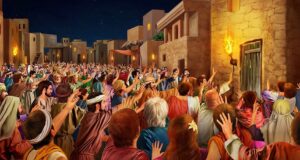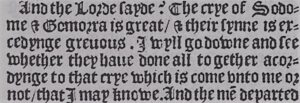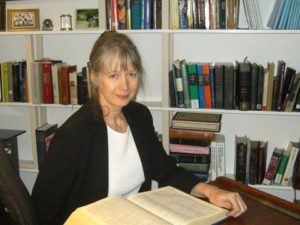What does Genesis 19:4 mean in the Matthew Bible (and King James Version) when it describes the evil people from Sodom who came from “all quarters” of the city and surrounded Lot’s house? Who made up this crowd of rioters, who were demanding that Lot deliver his guests, two men visiting the city, into their hands for rape and sexual assault?
But first, who were Lot’s guests? Lot did not realize it at the time, but they were angels who appeared as men. They had come to Sodom to destroy the city because of the wickedness of the people. At Lot’s invitation, these men-angels turned in to his house for refreshment and rest. What happened next is explained as follows in William Tyndale’s translation from the 1537 Matthew Bible:
Genesis 19:4-5 4But before they went to rest, the men of the city of Sodom compassed the house round about, both old and young, all the people from all quarters. 5And they called unto Lot and said unto him, Where are the men which came into thy house tonight? Bring them out unto us, that we may do our lust with them.

All the people of Sodom gather around Lot’s house.
To understand this event and the context of God’s judgement on the city, a question to ask is whether there were women among “all the people from all quarters” who surrounded Lot’s house. Tyndale’s translation allows for this possibility. In 16th century English, the word “men” could and frequently did include women, depending on the context. Also, “people” is a gender-neutral word. However modern Bibles, as will be seen, suggest or say outright that only males were involved. This would exclude half the population of the city.
The idea that the crowd of rioters in Sodom included both men and women is supported by two factors drawn from chapter 18 in Genesis:
(1) In verse 18:21, the Lord speaks with Abraham to warn him about the coming destruction of Sodom. From the Matthew Bible we learn that the Lord was going to go down to the city to see if the people there had all together done evil according to the outcry against them; that is, if all of the people together were doing evil. If so, it is reasonable to believe that the women of the city joined in with the men in all their evil-doing, including the attempt on Lot’s guests.

Genesis 18:20-21 in the 1537 Matthew Bible
I note here, however, that Genesis 18:21 in other Bible versions reads differently. Some speak of the people of Sodom doing altogether according to the outcry against them. I find this ambiguous.[1] The AMPC interpretive translation reads, “I will go down now and see whether they have done altogether [as vilely and wickedly] as the outcry which has come to me.” The CEV reads, “I am going down to see for myself if those people really are that bad.” These versions put the emphasis on the nature or degree of the evil in which the people were involved.
However, the Matthew Bible reading emphasizes the number of the people – whether all of them “all together” were involved in the evil that was being done. And this certainly fits best with the next question that Abraham asks: “But what if there are fifty righteous? Or forty, or thirty, or twenty, or ten?” (Genesis 18:22-32). He does not ask, “But what if they are not really that bad?” He asks, “What if they are not all of them bad?”
(2) Also, in chapter 18 the Lord promised Abraham that if there were only ten righteous people in the city, he would not destroy it. This shows that the concern was whether every person in the city, irregardless of sex, was corrupt.
The Hebrew word en-oshe in Genesis 19:4 may include both sexes, just as Tyndale’s English translation “men” formerly did. Therefore, nothing in the Hebrew nor in Tyndale’s translation limits the meaning to men alone. The correct sense must be derived from the context. And here the context, including chapter 18, indicates that both sexes were involved.
Martin Luther on the “distressing” meaning of Genesis 19:4
Martin Luther considered the question, what does Genesis 19:4 mean? He concluded that women were indeed among the rioters in Sodom, along also with the elders and governors of the city. He drew this in part from the meaning of the Hebrew idiom that Tyndale translated “old and young” in verse 4. In his lectures on Genesis, he explained:
This situation causes me to think that at that time there was a feast day, and that banquets were held throughout the city, for the entire city was in a frenzy. And though they did not all want to perpetrate the crime, they were nevertheless all involved in the endeavour and took pleasure in this raging of the citizens against the strangers. But he who commits a deed and he who gives his consent are in the same position.
… most distressing is [the phrase] “young and old.” [In Hebrew it] is a term for an age, and the Hebrews commonly use it when they speak of servants and maids. It denotes those who have reached the 20th, 24th, or 26th year, are now qualified by age to perform services, and now feel the passion of the flesh. All these join the citizens, the king, the counselors, the senators, and the aristocrats; Even old men are there, among whom sexual desire is dead, or who at least would have been able to check the frenzy of the rest because of their gray hair and their influence. And in order that you may understand the situation more clearly, the entire populace comes running at the same time from every corner of the city. To be sure, they could not all perpetrate this crime, but they were both delighted by the deed and gave their consent.[2]
Luther’s Hebrew studies were thorough and painstaking, and his judgement trustworthy. Given his exposition, and considering what chapter 18 says about the situation in Sodom, there should be no doubt that the people who surrounded Lot’s house included women, men, husbands, wives, maidservants, menservants, leaders, etc. This interpretation helps us understand that God’s judgement was just, and that not even ten righteous people were swept away with the evil.
What does Genesis 19:4 mean according to modern Bibles?
However, modern Bibles indicate, more or less clearly, that only males were involved in the evil endeavour against Lot’s guests, as shown below. In Genesis 19:4 in the 1611 KJV, the word “men” could be understood inclusively. But in the NIV and other modern versions the translators were generally careful to use ‘people’ where both sexes were intended, so the word “men” (and certainly “man”) would naturally be understood to indicate males only:
Genesis 19:4 in later Bibles
1611 KJV: But before they lay down, the men of the city, even the men of Sodom, compassed the house round, both old and young, all the people from every quarter.
NIV: Before they had gone to bed, all the men from every part of the city of Sodom—both young and old—surrounded the house.
CEV: Before Lot and his guests could go to bed, every man in Sodom, young and old, came and stood outside his house.
GW (God’s Word Translation): Before they had gone to bed, all the young and old male citizens of Sodom surrounded the house.
The GW translation expresses plainly the concept that only the “male citizens” of Sodom were involved in the attempt on Lot’s guests. However, this gives women an unwarranted pass, with implications not only for understanding what happened in Sodom, but, also, what is happening today. It also raises concerns in my mind about the present state of Hebrew scholarship. How well do moderns really understand the ancient Hebrew idioms, such as the one Luther discussed that is translated “young and old” in verse 4? When I see these kinds of developments in modern bibles it causes me to suspect that Hebrew scholarship was superior at the opening of Reformation, early in the 16th century, compared to today.[3]
The New Matthew Bible update of Genesis 19
The full text of chapters 1-25 of Genesis in the draft New Matthew Bible (NMB) can be viewed and freely downloaded here on the New Matthew Bible website. At Genesis 18:21 we kept Tyndale’s “all together,” and in verse 19:4 “men” was updated to “people,” so as not to appear to exclude women.
The NMB draft of Genesis 19:1-5 [4], including the preliminary chapter summary, reads:
Chapter 19
Lot received two angels into his house. The unclean lusts of the Sodomites. Lot is delivered and asks to dwell in the town of Zoar.
And there came two angels to Sodom in the evening. And Lot sat at the gate of the city. And Lot saw them and rose up to meet them, and he bowed himself to the ground with his face. 2And he said, See, lords, turn in I pray you, into your servant’s house. And stay the night, and wash your feet, and rise up early and go on your ways.
And they said, No, but we will stay in the streets all night.
3Then he compelled them exceedingly. And they turned in to him and entered into his house, and he made them a feast and baked sweet cakes, and they ate. 4But before they went to rest, the people of the city of Sodom compassed the house round about, both old and young – all the people from all quarters. 5And they called to Lot and said to him, Where are the men who went into your house tonight? Bring them out to us so that we can do our lust with them.
* * * * *
When, as was the case in Sodom, great violence against morality and one’s neighbour is no longer a matter of shame, but all people — men and women, high and low, young and old — join in it, and even clamour for it, is not destruction approaching? The incident with Lot and the angels is instructive. If the Holy Spirit had not included it in the biblical narrative, we might not be able to understand how far all the people had fallen together, as a group – nor even, perhaps, that such a thing is possible.
Ruth Magnusson Davis, November 2, 2020
Endnotes:
[1] The Oxford English Dictionary shows an obsolete adjectival construction of all together as altogether (see entry A.1 under “altogether”) and confirms that it was used to indicate all the people of a place. This appears to be one of the abbreviated word pairs of Early Modern English, which I discussed in How to Read the 1537 Matthew Bible.
[2] Martin Luther, “Lectures on Genesis,” Luther’s Works (American Edition), Volume 3, pages 253-54.
[3] However, Luther sometimes complained that the Hebrew grammarians of his day only confused things by attempting to resolve the meaning of Hebrew idioms through grammatical analysis, when by definition idioms do not follow the normal rules. (See for example volume 6 of Luther’s Works, page 52f and again at 181f). He regretted that much knowledge of ancient Hebrew idioms was lost, but commented that the New Testament had assisted in recovering and elucidating the language of the Old Testament. He was hopeful that further studies would recover the lost meaning of Hebrew idioms, but I suspect he would be disappointed with the state of things today. One of the most grave and pernicious modern developments in Hebrew studies is the re-definition of sheol and hades, which has developed since the publication of the 1894 Revised Version (which gave new meanings in the marginal notes), and since new definitions were advanced in Strong’s Concordance. Strong was a member of the RV revision committee, and his Concordance is in widespread popular use. This issue is reviewed in the Appendix to Coverdale’s book, The Hope of the Faithful.
[4] A note to people who subscribe for New Matthew Bible Project updates: This is a slightly revised version of Genesis 1-25 since I first posted it. Further revisions are likely.
___________
In 2009 Ruth M. Davis, a retired lawyer with an undergraduate degree in languages and linguistics, founded the New Matthew Bible (NMB) Project. The Project is dedicated to gently updating the Matthew Bible for today. In 2016 the New Testament was published as The October Testament. Work on the Old Testament is ongoing. Ruth also published The Story of the Matthew Bible in two parts. Part 1 is about the making of the MB. Part 2 examines revisions to the Scriptures from the Reformation to the present time. There have been an infinite number of revisions, great and small, but in Part 2 of The Story Ruth examines some of the most important, which are also little understood today.

Ruth Magnusson Davis in her study early in the NMB Project, about 2013
KP’s what does Genesis 19:4 mean? The meaning of Genesis 19:4.
